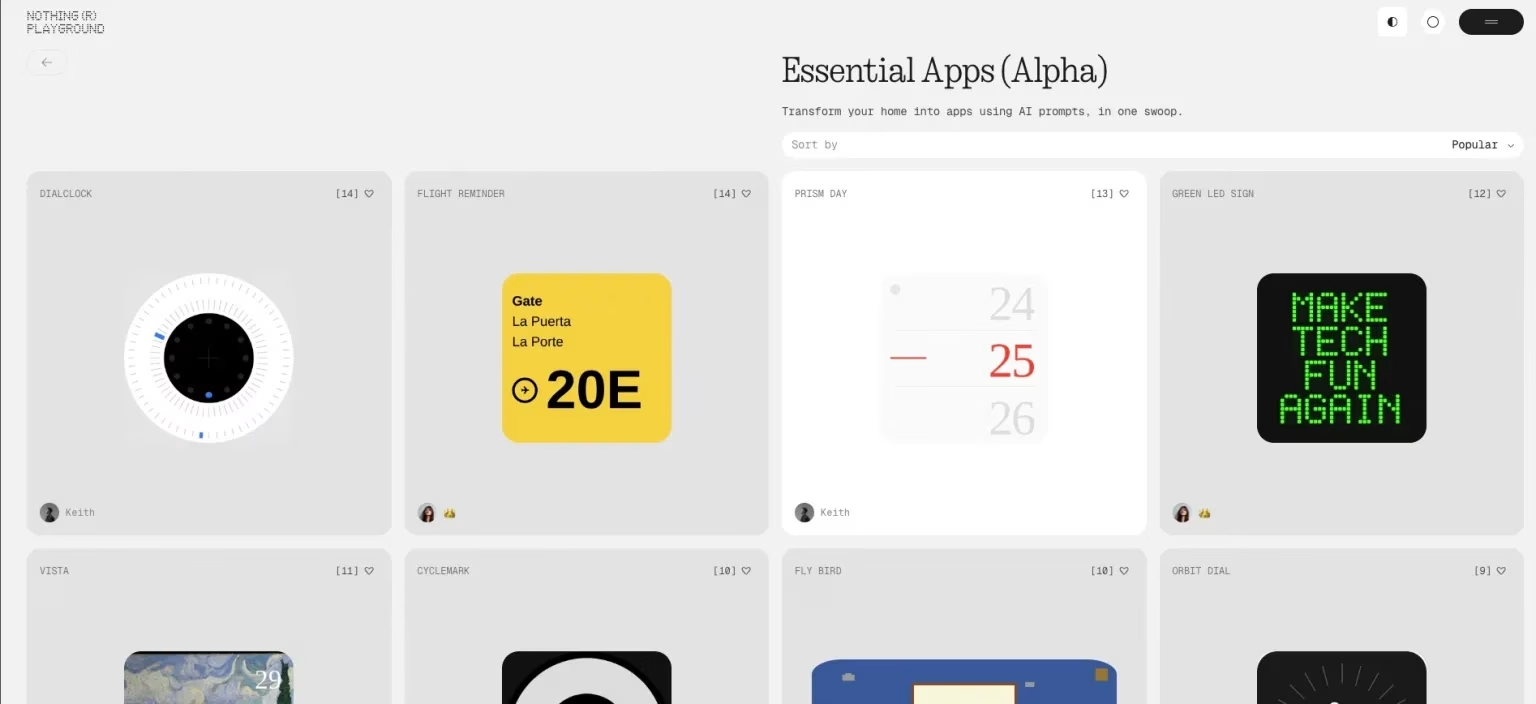Playground aims to democratize app creation and deploy creations to Essential Apps platform.

The core of Playground lies in its accessibility. Users can now describe their desired app functionality in plain text, and the AI engine translates these instructions into a working application. Imagine wanting a simple daily water intake tracker with visual progress indicators; a prompt like "Create a water tracker app that logs daily intake and shows a weekly progress bar" could potentially yield a ready-to-use tool. This capability dramatically lowers the barrier to entry for app creation, opening doors for individuals and small businesses to build bespoke solutions without extensive technical knowledge.
Playground doesn't just create apps; it deploys them to a new platform Nothing is calling "Essential Apps." This curated space appears to function as a lightweight app store specifically for these AI-generated creations. The implication is that users won't just be building apps for personal use; they'll be able to share them, discover creations from others, and potentially even iterate on existing designs. This could foster a vibrant community of creators and users, all contributing to a more personalized and dynamic mobile software landscape.
Nothing's vision for Playground is ambitious, with the company suggesting it's a foundational step towards an "AI OS." While some industry observers, like those at The Verge, have characterized it more as an advanced feature set built upon their existing Nothing OS rather than a complete operating system overhaul, the impact on user interaction with their devices could be profound. The integration is expected to be seamless, particularly with the upcoming Nothing Phone 3, which will reportedly receive an over-the-air update to enable Playground access.
The process is designed to be remarkably straightforward. Users interact with Playground through a simple interface, typing out their app idea. The AI then interprets this prompt, generating the user interface, underlying logic, and even basic integrations such as calendar syncing or notification capabilities. This rapid development cycle means that an app could theoretically be conceived, built, and ready for use within minutes.
For instance, a user might prompt: "Build a simple recipe organizer that allows me to save ingredients and cooking steps, with a search function." Playground would then process this, generating the necessary screens and data structures. Following the initial creation, users can further refine their apps with follow-up prompts, tweaking designs or adding functionalities. This iterative approach ensures that the final product closely matches the user's intent.
Nothing has also emphasized a privacy-focused approach, suggesting that much of the processing for sensitive prompts will occur on-device, aligning with their broader commitment to user data control. While specific pricing models haven't been detailed, initial access is expected to be free for Nothing Phone users, with potential for premium features or expanded AI models in the future.
This launch places Nothing squarely in the burgeoning field of AI-driven innovation, a trend that has dominated the tech landscape throughout 2024. Founded by Carl Pei, formerly of OnePlus, Nothing has consistently aimed to disrupt the market with unique hardware and software integrations. Playground builds upon this ethos, leveraging the power of AI to empower its user base in a way that few hardware manufacturers have attempted directly.
The move also reflects a broader industry shift towards no-code and low-code development platforms. Tools that abstract away complex coding are gaining traction, and Nothing's integration of such capabilities directly into their hardware ecosystem could be a significant differentiator. By targeting smartphone users who desire quick, personalized software solutions without resorting to the often-cluttered app stores, Nothing is carving out a unique niche.
The company's official statements highlight this user-centric philosophy. "Playground is our first step toward an AI-focused operating system, where creativity isn't limited by code—it's sparked by ideas," Nothing stated on their website. The rollout is slated to begin with the Nothing Phone 3 in key markets like the US, UK, and India, with a global expansion anticipated for the latter half of 2025.
The tech community has responded with a mixture of excitement and cautious optimism. Social media channels are already buzzing with discussions about potential use cases, from personal productivity tools to niche hobbyist applications. Early reports from beta testers suggest that Playground performs well for simpler app concepts, though its capabilities for highly complex integrations are still being evaluated.
Experts acknowledge the innovation but also point to potential limitations. The reliance on Nothing's own ecosystem, while offering a cohesive experience, might restrict its reach compared to more open AI development platforms. Nevertheless, the potential for increased user engagement is undeniable. If Nothing can successfully foster a thriving community around Essential Apps, it could lead to a significant increase in how users interact with and customize their devices.
The implications for the broader mobile market are substantial. As other tech giants explore similar AI integration in their operating systems, Nothing's proactive approach with Playground could set a precedent. It raises the question: will the future of mobile software involve users becoming creators of their own tailored applications, rather than just consumers? Only time will tell, but Nothing's Playground initiative certainly offers a compelling glimpse into that possibility.